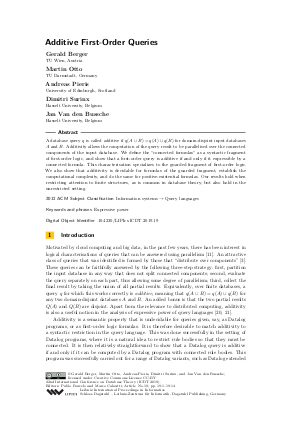Additive First-Order Queries
Authors Gerald Berger, Martin Otto, Andreas Pieris, Dimitri Surinx, Jan Van den Bussche
-
Part of:
Volume:
22nd International Conference on Database Theory (ICDT 2019)
Part of: Series: Leibniz International Proceedings in Informatics (LIPIcs)
Part of: Conference: International Conference on Database Theory (ICDT) - License:
 Creative Commons Attribution 3.0 Unported license
Creative Commons Attribution 3.0 Unported license
- Publication Date: 2019-03-19
File

PDF
LIPIcs.ICDT.2019.19.pdf
- Filesize: 497 kB
- 14 pages
Document Identifiers
Subject Classification
ACM Subject Classification
- Information systems → Query languages
Keywords
- Expressive power
Metrics
- Access Statistics
-
Total Accesses (updated on a weekly basis)
0PDF Downloads0Metadata Views
Abstract
A database query q is called additive if q(A U B) = q(A) U q(B) for domain-disjoint input databases A and B. Additivity allows the computation of the query result to be parallelised over the connected components of the input database. We define the "connected formulas" as a syntactic fragment of first-order logic, and show that a first-order query is additive if and only if it expressible by a connected formula. This characterisation specializes to the guarded fragment of first-order logic. We also show that additivity is decidable for formulas of the guarded fragment, establish the computational complexity, and do the same for positive-existential formulas. Our results hold when restricting attention to finite structures, as is common in database theory, but also hold in the unrestricted setting.
Cite As Get BibTex
Gerald Berger, Martin Otto, Andreas Pieris, Dimitri Surinx, and Jan Van den Bussche. Additive First-Order Queries. In 22nd International Conference on Database Theory (ICDT 2019). Leibniz International Proceedings in Informatics (LIPIcs), Volume 127, pp. 19:1-19:14, Schloss Dagstuhl – Leibniz-Zentrum für Informatik (2019)
https://doi.org/10.4230/LIPIcs.ICDT.2019.19
BibTex
@InProceedings{berger_et_al:LIPIcs.ICDT.2019.19,
author = {Berger, Gerald and Otto, Martin and Pieris, Andreas and Surinx, Dimitri and Van den Bussche, Jan},
title = {{Additive First-Order Queries}},
booktitle = {22nd International Conference on Database Theory (ICDT 2019)},
pages = {19:1--19:14},
series = {Leibniz International Proceedings in Informatics (LIPIcs)},
ISBN = {978-3-95977-101-6},
ISSN = {1868-8969},
year = {2019},
volume = {127},
editor = {Barcelo, Pablo and Calautti, Marco},
publisher = {Schloss Dagstuhl -- Leibniz-Zentrum f{\"u}r Informatik},
address = {Dagstuhl, Germany},
URL = {https://drops.dagstuhl.de/entities/document/10.4230/LIPIcs.ICDT.2019.19},
URN = {urn:nbn:de:0030-drops-103217},
doi = {10.4230/LIPIcs.ICDT.2019.19},
annote = {Keywords: Expressive power}
}
Author Details
References
-
S. Abiteboul, R. Hull, and V. Vianu. Foundations of Databases. Addison-Wesley, 1995.

-
N. Alechina and Y. Gurevich. Syntax vs semantics on finite structures. In J. Mychielski, G. Rozenberg, and A. Salomaa, editors, Structures in Logic and Computer Science, volume 1261 of Lecture Notes in Computer Science, pages 14-33. Springer, 1997.

-
T.J. Ameloot, B. Ketsman, F. Neven, and D. Zinn. Weaker forms of monotonicity for declarative networking: A more fine-grained answer to the CALM-conjecture. ACM Transactions on Database Systems, 40(4):article 21, 2016.

-
T.J. Ameloot, B. Ketsman, F. Neven, and D. Zinn. Datalog queries distributing over components. ACM Transactions on Computational Logic, 18:article 5, 2017.

-
H. Andréka, I. Németi, and J. van Benthem. Modal languages and bounded fragments of predicate logic. Journal of Philosophical Logic, 27(3):217-274, 1998.

-
G. Berger and A. Pieris. Ontology-mediated queries distributing over components. In S. Kambhampati, editor, Proceedings 25th International Joint Conference on Artificial Intelligence, pages 943-949. IJCAI/AAAI Press, 2016.

-
M. Bienvenu, C. Lutz, and F. Wolter. Query containment in description logics reconsidered. In G. Brewka, T. Eiter, and S.A. McIlraith, editors, Principles of Knowledge Representation and Reasoning: Proceedings 13th KR. AAAI Press, 2012.

-
H. Gaifman. On local and nonlocal properties. In Proceedings of the Herbrand symposium (Marseilles, 1981), volume 107 of Studies in Logic and the Foundations of Mathematics. North-Holland, 1982.

-
E. Grädel. On the restraining power of guards. Journal of Symbolic Logic, 64(4):1719-1742, 1999.

-
E. Grädel and I. Walukiewicz. Guarded fixed point logic. In Proceedings 14th Annual IEEE Symposium on Logic in Computer Science, pages 45-54, 1999.

-
J.M. Hellerstein. The declarative imperative: Experiences and conjectures in distributed logic. SIGMOD Record, 39(1):5-19, 2010.

-
D. Leinders, M. Marx, J. Tyszkiewicz, and J. Van den Bussche. The semijoin algebra and the guarded fragment. Journal of Logic, Language and Information, 14:331-343, 2005.

-
D. Leinders and J. Van den Bussche. On the complexity of division and set joins in the relational algebra. J. Comput. Syst. Sci., 73(4):538-549, 2007.

- M. Otto. Elementary proof of the van Benthem-Rosen characterization theorem. Fachbereich Informatik online preprint 2342, TU Darmstadt, 2004. URL: http://www3.mathematik.tu-darmstadt.de/fb/mathe/preprints.html.
-
M. Otto. Modal and guarded characterisation theorems over finite transition systems. Annals of Pure and Applied Logic, 130:173-205, 2004.

-
M. Otto. Bisimulation invariance and finite structures. In Z. Chatzidakis, P. Koepke, and W. Pohlers, editors, Logic Colloquium '02, volume 27 of Lecture Notes in Logic, pages 276-298. Cambridge University Press, 2006.

-
E. Rosen. Modal logic over finite structures. Journal of Logic, Language and Information, 5:427-439, 1997.

-
E. Rosen. Some aspects of model theory and finite structures. Bulletin of Symbolic Logic, 8:380-403, 2002.

-
Y. Sagiv and M. Yannakakis. Equivalence among Relational Expressions with the Union and Difference Operators. J. ACM, 27(4):633-655, 1980.

-
D. Surinx, J. Van den Bussche, and D. Van Gucht. The primitivity of operators in the algebra of binary relations under conjunctions of containments. In Proceedings 32nd Annual ACM/IEEE Symposium on Logic in Computer Science. IEEE Computer Society Press, 2017.

-
D. Surinx, J. Van den Bussche, and D. Van Gucht. A framework for comparing query languages in their ability to express boolean queries. In Foundations of Information and Knowledge Systems, pages 360-378, 2018.

-
J.D. Ullman. Principles of Database and Knowledge-Base Systems, volume I. Computer Science Press, 1988.

-
J. van Benthem. Modal Logic and Classical Logic. Bibliopolis, Naples, 1983.

